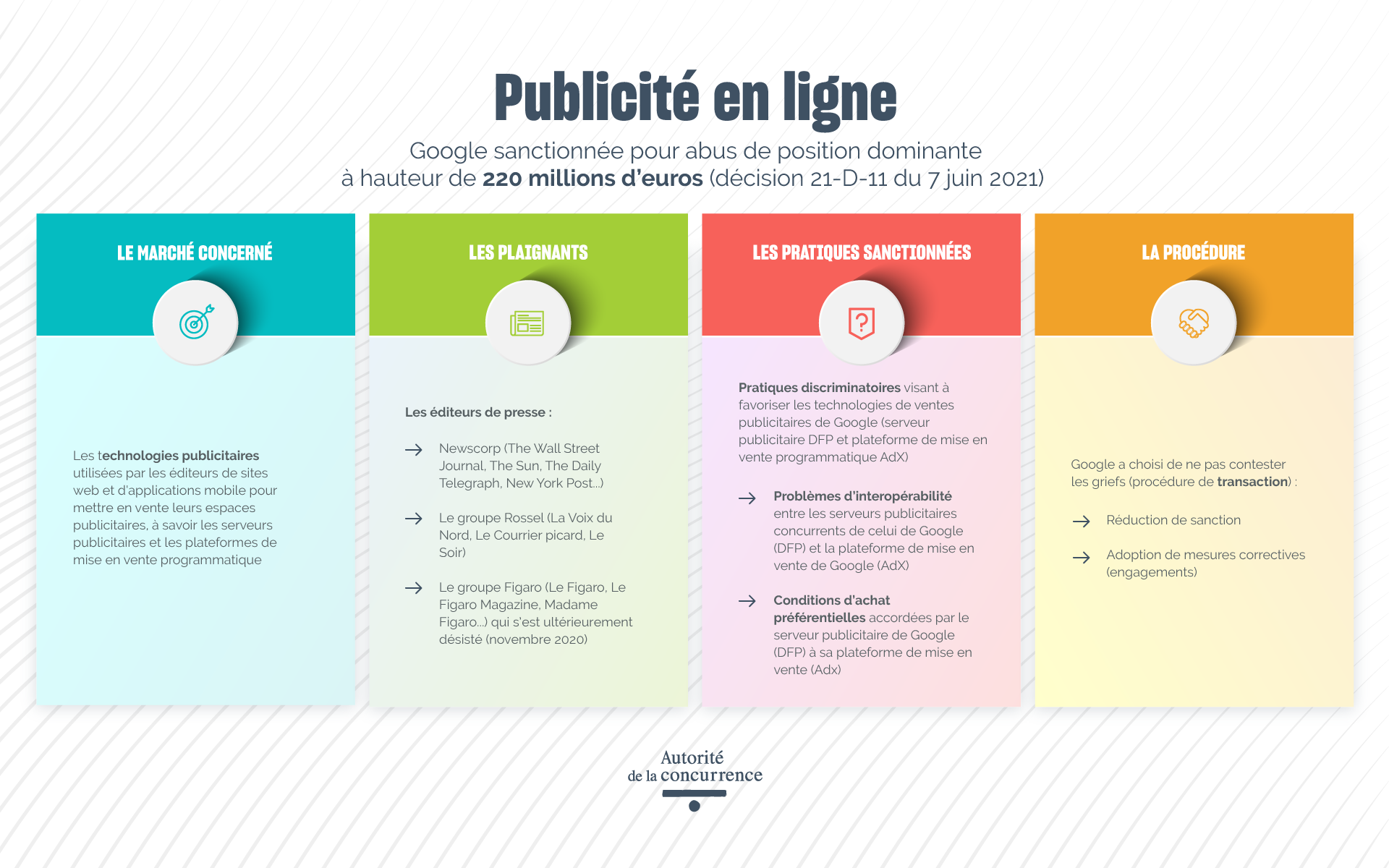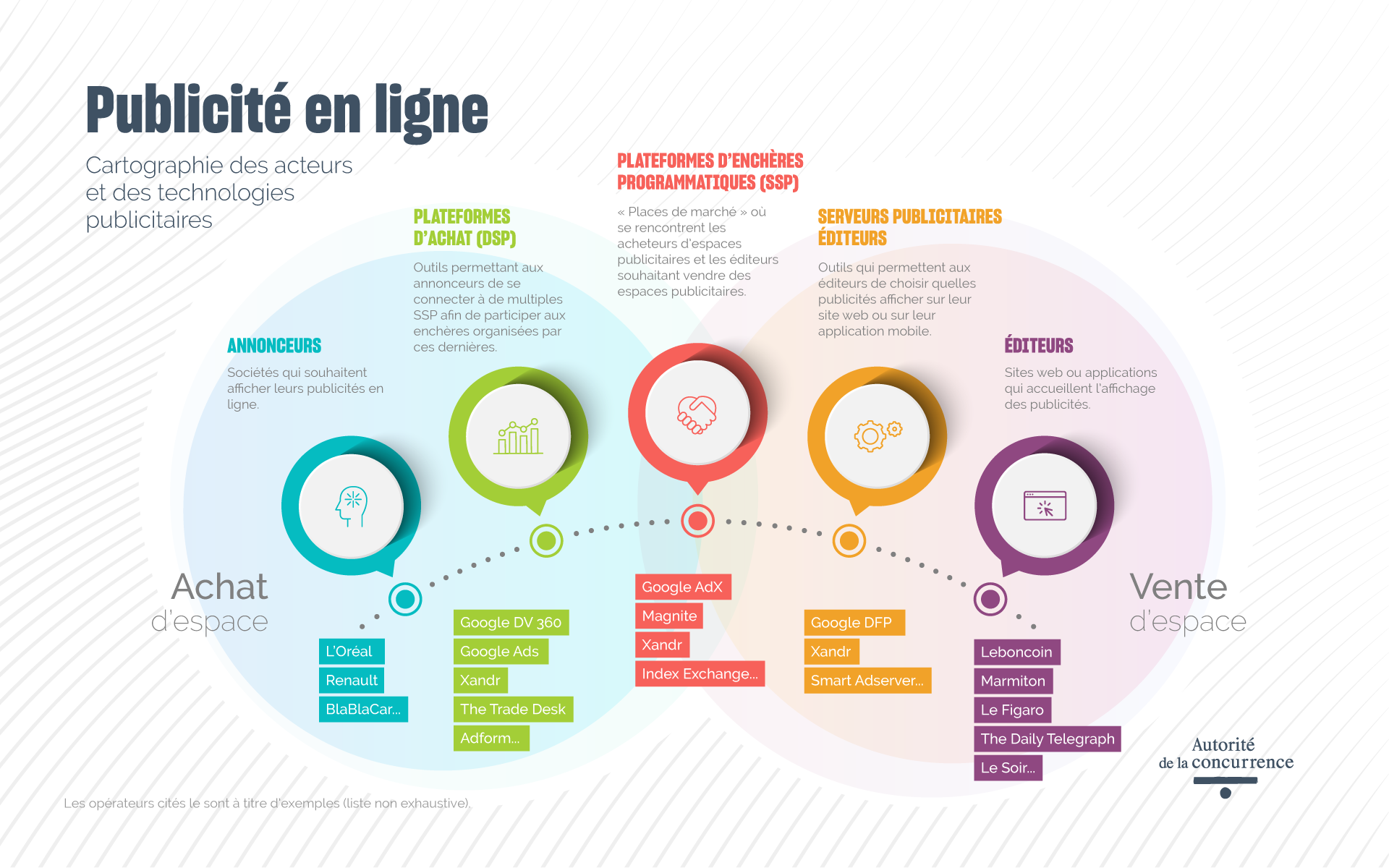The Autorité de la concurrence hands out a €220 millions fine to Google for favouring its own services in the online advertising sector

Google, which did not dispute the facts, wished to settle with the Autorité, which granted its request.
Google also proposed commitments, accepted by the Autorité, that will change the way its advertising service DFP and its sales platform AdX function.

Background
Following referrals from News Corp Inc., Le Figaro group[1] and the Rossel La Voix group, the Autorité de la concurrence issues today a decision sanctioning Google, up to 220 million euros, for having abused its dominant position in the advertising server market for website and mobile applications publishers. The Autorité noted that Google granted preferential treatment to its proprietary technologies offered under the Google Ad Manager brand, both with regard to the operation of the DFP ad server (which allows publishers of sites and applications to sell their advertising space), and its SSP AdX sales platform (which organises the auction process allowing publishers to sell their “impressions” or advertising inventories to advertisers) to the detriment of its competitors and publishers.
The practices in question are particularly serious because they penalised Google's competitors in the SSP market and publishers of mobile sites and applications. Among these, the press groups - including those who were at the origin of the referral to the Autorité - were affected even though their economic model is also strongly weakened by the decline in sales of print subscriptions and the decline in associated advertising revenue.
The Autorité recalls that a company in a dominant position is subject to a particular responsibility, that of not undermining, by conduct unrelated to competition on the merits, to an effective and undistorted competition.
Google, which did not dispute the facts, wished to benefit from the settlement procedure. The Autorité granted its request. Google proposed commitments to improve the interoperability of Google Ad Manager services with third-party ad server and advertising space sales platform solutions and end provisions that favour Google. The Autorité accepted these commitments and makes them binding in its decision.
Isabelle de Silva, President of the Autorité de la concurrence stated on the occasion of this decision: "The decision sanctioning Google has a very special meaning because it is the first decision in the world to look into complex algorithmic auctions processes through which online display advertising works. The particularly rapid investigation revealed processes by which Google, building on its considerable dominance in ad servers for websites and applications, outperformed its competitors on both ad servers and SSP platforms. These very serious practices penalised competition in the emerging online advertising market, and allowed Google not only to maintain but also to increase its dominant position. This sanction and these commitments will make it possible to re-establish a level playing field for all players, and the ability for publishers to make the most of their advertising space. "
[1] Le Figaro group withdrew its complaint on 6 November 2020.
Advertising technologies for website and mobile app publishers
In order to market the advertising space present within their sites and applications, publishers use different types of technologies, and in particular ad server technologies and platform for the programmatic sale of advertising space:
- the ad server is a tool that allows publishers to display advertisements on their website or on their mobile application. It also makes it possible to manage the sale of advertising space in a unified manner, in particular by giving publishers the ability to choose, for the same advertising space, between transactions concluded directly with advertisers and the sale on multiple platforms organising auctions programmatically (i.e. using an automated mechanism).
- the platforms for the programmatic sale of advertising space (known as “SSP” for “supply side platform”) are “market places” where buyers of advertising space meet publishers wishing to sell advertising space. They request, for a given advertising space, a price offer from the advertisers, conduct an auction between the different prices offered by the advertisers, and transmit the winning bid to the advertising server.
In order to optimise their income, publishers tend to sell the same advertising space via several auction platforms simultaneously. In contrast, publishers generally use a single ad server to organise competition between different sales platforms. As a result, the interoperability of an ad server with the listing platforms determines both the revenue publishers earn from their advertising space, and their ability to market it, and the attractiveness of the listing platforms.
Google’s alledged practices by the complainant press editors
News Corp Inc., Le Figaro group (which then withdrew) and the Rossel La Voix group publish websites and mobile applications. They monetise their content through the provision of advertising space and to do this, use two advertising technologies offered by Google, namely:
- the Doubleclick for publishers ad server (hereinafter “DFP”);
- the platform for the programmatic sale of Doubleclick AdExchange advertising space (hereinafter "AdX").
The complainants argued that Google has behaved in such a way that these two technologies - both marketed under the Google Ad Manager brand since the summer of 2018 - benefit each other, to the detriment of both competing technology providers and the market performance of their online advertising inventories.
Google has implemented different practices to favour its own advertising technologies
The elements in the case show that Google has implemented two distinct practices aimed at ensuring that its ad server DFP favours its platform for selling advertising space (SSP AdX) and, conversely, that its SSP AdX platform favours its ad server DFP.
First, the DFP ad server organises an unfair competition between the AdX sales platform and its competitors. The exact modalities of this practice have varied over the review period, especially since there are several methods by which a competing platform can interact with DFP.
One of the most notable asymmetries is that DFP indicated, until recently, the price offered by competing platforms to AdX, and that the latter used this information to optimise its bids and maximise its chances to win them against competing SSPs, in particular by varying its commission according to the competitive pressure emanating from other SSPs.
Second, the AdX platform is only partially interoperable with DFP's competing ad servers, and does not allow the latter to organise a competition between AdX and its competitors - even though AdX itself has a privileged access to a significant portion of advertisers' demand and while all of these competitors have adopted standards allowing for fairer competition.
Serious practices which already had significant effects on the markets
These practices are all the more serious as they took place in a still emerging market with strong growth and they may have affected the ability of competitors to develop in the market. In particular, they have limited the attractiveness of ad servers and third-party SSPs from a publisher's perspective, and have enabled Google to significantly increase its market share and its already high revenues. In this regard, the Autorité notes that several of Google's competitors experienced significant difficulties during the period of the practices, while Google benefited from strong growth in its activity and revenues, even increasing its already considerable market share on a rapidly growing market.
The practices, however, did not only affect the competitors. Indeed, publishers for their part have been deprived of the possibility of making full use of the competition between the various SSPs. In particular, publishers have not been able to obtain the best deals from SSPs, and in particular from Google's AdX platform, which, already dominant, has seen the competitive pressure exerted by its competitors lessened as a result of practices.
In this regard, the press groups, some of which were at the origin of the complaint to the Autorité, and whose economic model is severely weakened by the decline in sales of print subscriptions and the decline in associated advertising revenues, have been particularly affected by Google's practices.
These practices took place even though Google was regularly alerted to the importance of compliance with competition rules by both the European Commission and the Autorité, thus appearing to be a particularly well-informed economic player. The Commission thus sanctioned Google in connection with the Google Shopping (27 June 2017), Google Android (18 July 2018) and Google Search AdSense (20 March 2019)[1] cases. The Autorité also sanctioned it in the Google Gibmedia case (19 December 2019)[2] for having imposed non-objective, non-transparent and discriminatory operating rules on advertisers using its Gogle Ads advertising platform.
Google's non contestation of objections
Google requested the Autorité to benefit from the settlement procedure provided for in III of Article L. 464-2 of the French Commercial Code. Consequently, Google has not disputed either the materiality of the practices in question, their legal qualification, or their imputability.
The implementation of this procedure resulted in the establishment of the Minutes of Settlement signed with the General Rapporteur, setting the maximum amount and the minimum amount of the fine that could be imposed by the Autorité. In this context, Google also proposed commitments aimed at improving the interoperability of Google Ad Manager services with third-party ad server and sales platform solutions.
Fines imposed
In view of all of these elements and in accordance with the terms of the transaction, the Autorité imposed a 220 million euros fine against Google.
It also makes the commitments proposed by Google mandatory, namely:
-
- offer third-party SSPs an interoperability modality with the DFP server allowing competition on the merits between AdX and third-party SSPs for the purchase of inventories from publishers using DFP. This commitment involves:
- to allow fair access to information on the auction process for third-party SSPs (commitment n°1);
- to preserve the full contractual freedom of third-party SSPs so that they can negotiate special conditions with publishers or to make the wished buyers (commitment n° 2);
- to ensure that AdX no longer uses the price of its competitors in order to optimise its bids in a way that is not reproducible by third-party SSPs (commitment n° 3);
- to offer guarantees of technical stability, both for third-party SSPs and for publishers (commitment n° 4).
- to make changes to existing configurations that allow publishers using third-party ad servers to access AdX on-demand in "real-time" (commitment n° 5).
- offer third-party SSPs an interoperability modality with the DFP server allowing competition on the merits between AdX and third-party SSPs for the purchase of inventories from publishers using DFP. This commitment involves:
Google has also undertaken to appoint an independent trustee, remunerated by it, who will be in charge of monitoring the implementation of these commitments, and will transmit all the information enabling the Autorité to exercise its control over these commitments.
The Autorité considered that these commitments are likely to promote the restoration of compliance for Google and improve the competitive functioning of the market for ad servers and SSP platforms. It therefore makes them mandatory, for a period of three years from the date of the notification of the decision or, where applicable, following their effective implementation.
[1] Commission decisions of 27 June 2017, AT.39740 - Google Search (Shopping); of 18 July 2018, AT.40099 - Google Androïd; of 20 March 2019, AT.40411 - Google Search (Adsense).
[2] Decision 19-D-26 of 19 December 2019 regarding practices implemented in the online search advertising sector.
